Introduction of Psychology
心理学自学入门必读书籍

心理学自学入门必读书籍以心理学自学入门必读书籍为题,我们将为大家推荐一些在心理学领域非常经典和有价值的书籍,这些书籍将帮助你初步了解心理学的基础知识,并为进一步学习打下坚实的基础。
1.《心理学导论》(Introduction to Psychology)作者:罗德·皮尔斯(Rod Plotnik)与豪克·卡尔森(Haig Kouyoumdjian)这本书是一本经典的心理学导论教材,适合初学者阅读。
它介绍了心理学的基本概念、理论和方法,涵盖了认知、发展、社会和临床等各个领域的内容,让读者对心理学有一个全面的了解。
2.《心理学与生活》(Psychology and Life)作者:理查德·格里格(Richard J. Gerrig)这本书以生活案例为基础,生动有趣地介绍了心理学的基本概念和原理。
它不仅涵盖了认知、情绪、人格等传统的心理学领域,还关注了心理学在日常生活中的应用,让读者更好地理解和运用心理学知识。
3.《心理学的奥秘》(The Secret Life of the Mind)作者:玛丽·萨莉文(Marianne Miserandino)这本书深入浅出地解释了一些心理学的基本概念和原理,并通过丰富的案例和故事讲述了心理学在我们日常生活中的应用。
它帮助读者更好地理解自己和他人的思维、情感和行为,并提供了一些实用的技巧和建议。
4.《行为心理学》(Behavioral Psychology)作者:威廉·海根(William H. Hayt)这本书重点介绍了行为心理学的基本概念和原理。
它涵盖了条件反射、学习理论、行为分析等内容,帮助读者了解和解释人类行为背后的原因和机制。
5.《社会心理学》(Social Psychology)作者:戴维·迈尔斯(David G. Myers)这本书详细介绍了社会心理学的理论和实证研究,探讨了个体与群体之间的互动关系、社会认知、社会影响等内容。
Introduction to Psychology
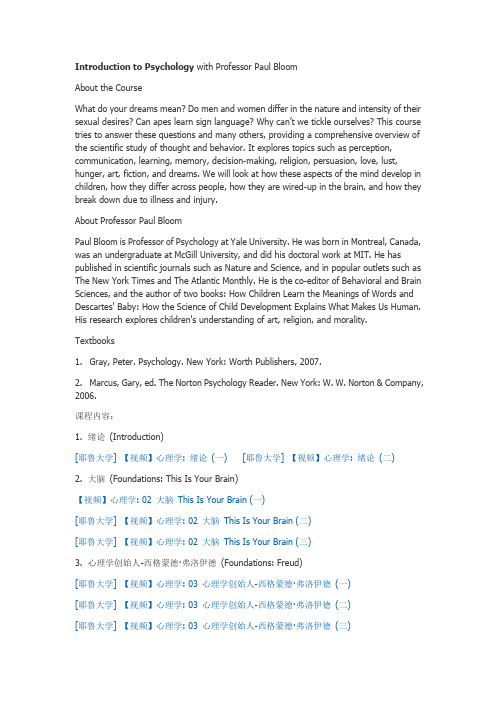
Introduction to Psychology with Professor Paul BloomAbout the CourseWhat do your dreams mean? Do men and women differ in the nature and intensity of their sexual desires? Can apes learn sign language? Why can’t we tickle ourselves? This course tries to answer these questions and many others, providing a comprehensive overview of the scientific study of thought and behavior. It explores topics such as perception, communication, learning, memory, decision-making, religion, persuasion, love, lust, hunger, art, fiction, and dreams. We will look at how these aspects of the mind develop in children, how they differ across people, how they are wired-up in the brain, and how they break down due to illness and injury.About Professor Paul BloomPaul Bloom is Professor of Psychology at Yale University. He was born in Montreal, Canada, was an undergraduate at McGill University, and did his doctoral work at MIT. He has published in scientific journals such as Nature and Science, and in popular outlets such as The New York Times and The Atlantic Monthly. He is the co-editor of Behavioral and Brain Sciences, and the author of two books: How Children Learn the Meanings of Words and Descartes' Baby: How the Science of Child Development Explains What Makes Us Human. His research explores children's understanding of art, religion, and morality.Textbooks1. Gray, Peter. Psychology. New York: Worth Publishers, 2007.2. Marcus, Gary, ed. The Norton Psychology Reader. New York: W. W. Norton & Company, 2006.课程内容:1. 绪论(Introduction)[耶鲁大学] 【视频】心理学: 绪论(一)[耶鲁大学] 【视频】心理学: 绪论(二)2. 大脑(Foundations: This Is Your Brain)【视频】心理学: 02 大脑This Is Your Brain (一)[耶鲁大学] 【视频】心理学: 02 大脑This Is Your Brain (二)[耶鲁大学] 【视频】心理学: 02 大脑This Is Your Brain (三)3. 心理学创始人-西格蒙德·弗洛伊德(Foundations: Freud)[耶鲁大学] 【视频】心理学: 03 心理学创始人-西格蒙德·弗洛伊德(一)[耶鲁大学] 【视频】心理学: 03 心理学创始人-西格蒙德·弗洛伊德(二)[耶鲁大学] 【视频】心理学: 03 心理学创始人-西格蒙德·弗洛伊德(三)4. 美国行为主义心理学家-B.F.斯金纳(Foundations: Skinner)[耶鲁大学] 【视频】心理学: 04 美国行为主义心理学家-B.F.斯金纳5. 思维的发展(What Is It Like to Be a Baby: The Development of Thought)[耶鲁大学] 【视频】心理学: 05 思维的发展The Development of Thought6. 人类交流的途径:大脑,口部及手部语言(How Do We Communicate?: Language in the Brain, Mouth and the Hands)[耶鲁大学] 【视频】心理学: 06 人类交流的途径:大脑,口部及手部语言7. 现在意识和过去意识:语言,想象与记忆(Conscious of the Present; Conscious of the Past: Language (cont.); Vision and Memory)[耶鲁大学] 【视频】心理学: 07 现在意识和过去意识:语言,想象与记忆8. 现在意识和过去意识:想象与记忆(Conscious of the Present; Conscious of the Past: Vision and Memory (cont.))[耶鲁大学] 【视频】心理学: 08 现在意识和过去意识:想象与记忆Vision and Memory9. 演变,情感与理性:爱(Evolution, Emotion, and Reason: Love (Guest Lecture by Professor Peter Salovey))[耶鲁大学] 【视频】心理学: 09 演变,情感与理性:爱Love10. 演变,情感与理性:演变与合理性(Evolution, Emotion, and Reason: Evolution and Rationality)[耶鲁大学] 【视频】心理学: 10 演变,情感与理性:演变与合理性Evolution and Rationalit11. 演变,情感与理性:情感(Evolution, Emotion, and Reason: Emotions, Part I)[耶鲁大学] 【视频】心理学: 11 演变,情感与理性:情感Emotions12. 演变,情感与理性:情感(续)(Evolution, Emotion, and Reason: Emotions, Part II)[耶鲁大学] 【视频】心理学: 12 演变,情感与理性:情感续13. 人与人之间的差异(Why Are People Different?: Differences)[耶鲁大学] 【视频】心理学: 13 人与人之间的差异Differences14. 心理学: 性(What Motivates Us: Sex)[耶鲁大学] 【视频】心理学: 14 性What Motivates Us: Sex15. 心理学: 道德(A Person in the World of People: Morality)[耶鲁大学] 【视频】心理学: 15 道德Morality16. 心理学: 自我和他人(A Person in the World of People: Self and Other, Part I)[耶鲁大学] 【视频】心理学: 16 自我和他人Self and Other17. 自我和他人(续) (A Person in the World of People: Self and Other, Part II; Some Mysteries: Sleep, Dreams, and Laughter)[耶鲁大学] 【视频】心理学: 17 自我和他人续Self and Other18. 心理学: 精神病(What Happens When Things Go Wrong: Mental Illness, Part I (Guest Lecture by Professor Susan Nolen-Hoeksema))[耶鲁大学] 【视频】心理学: 18 精神病Mental Illness19. 心理学: 精神病(续)(What Happens When Things Go Wrong: Mental Illness, Part II)[耶鲁大学] 【视频】心理学: 19 精神病续Mental Illness20. 心理学: 美好生活:幸福(The Good Life: Happiness)[耶鲁大学] 【视频】心理学: 20 美好生活:幸福The Good Life: Happiness。
introduction to psychology书 -回复
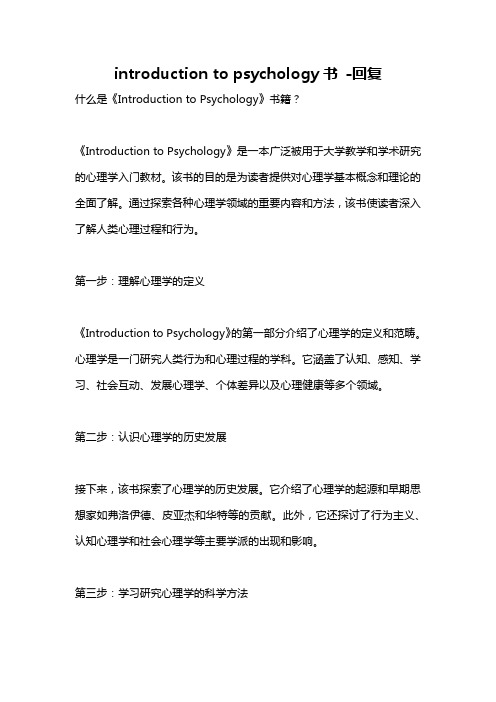
introduction to psychology书-回复什么是《Introduction to Psychology》书籍?《Introduction to Psychology》是一本广泛被用于大学教学和学术研究的心理学入门教材。
该书的目的是为读者提供对心理学基本概念和理论的全面了解。
通过探索各种心理学领域的重要内容和方法,该书使读者深入了解人类心理过程和行为。
第一步:理解心理学的定义《Introduction to Psychology》的第一部分介绍了心理学的定义和范畴。
心理学是一门研究人类行为和心理过程的学科。
它涵盖了认知、感知、学习、社会互动、发展心理学、个体差异以及心理健康等多个领域。
第二步:认识心理学的历史发展接下来,该书探索了心理学的历史发展。
它介绍了心理学的起源和早期思想家如弗洛伊德、皮亚杰和华特等的贡献。
此外,它还探讨了行为主义、认知心理学和社会心理学等主要学派的出现和影响。
第三步:学习研究心理学的科学方法随后,该书分析了研究心理学所使用的科学方法。
它介绍了实证研究的基本原则、统计分析和伦理问题。
读者将了解如何设计和执行心理学实验、调查和观察,并学习如何解释和报告研究结果。
第四步:探索认知和感知领域《Introduction to Psychology》的下一个部分重点介绍了认知和感知领域的重要概念。
它讨论了记忆、思维、意识、语言和问题解决等认知过程,同时探讨了视觉、听觉和触觉等感知过程的基础原理。
第五步:了解学习和行为领域该书继续探讨了学习和行为领域的关键内容。
读者将了解到经典条件作用、操作条件作用和观察学习等学习理论。
此外,它还涵盖了动机、情绪和人格等行为领域的重要主题。
第六步:学习社会互动和发展心理学《Introduction to Psychology》的下一部分介绍了社会互动和发展心理学。
它探讨了社会认知、社会影响和群体行为等社会心理学主题。
同时,它还涵盖了儿童和青少年发展、成年发展和老年发展等不同阶段的个体差异。
01 Introduction to Psychology-补充-心理学与你-苏彦捷

心理学与你●苏彦捷副教授我们系办心理学文化节,叫我来讲一些心理学的问题。
他们让我讲“心理学与你”,这个题目太大了,不可能细讲,这样也好,只粗略地讲一下,让大家对心理学有个大概的了解。
如果你把研究心理学作为职业,不可能什么心理学都搞,每个人只做一方面,大家合在一起就是整个的心理学。
今天我们从一般人认识中的心理学入手。
你们可能碰到一个学心理学的就想问他知不知道我们在想什么,这个问题不好回答。
许多心理学家都在研究人的行为规律,但研究内容在具体情况下有所不同。
今天我们就讲讲与生活密切相关的常识。
有一句话说每个人都是半个心理学家,或说通俗心理学家(folk psychology),一个热心人也可以给人解决心理问题,因为每个人都对生活经验有所积累,对人的行为有所了解,虽然许多都是误解。
心理学家就是探测一些规律。
举一个例子,你们说做一个梦要多长时间?几分钟?几个钟头?心理学家通过研究脑的电位变化规律来解答这个问题。
他们发现在睡眠的不同阶段脑电波的频率不同,将要入睡时是8-12Hz/s,睡眠越深频率越慢。
后来又发现人在做梦时电位快,电波幅度小,伴随着快速眼动。
电位和快速眼动这两个指标表明你正在做梦。
这样研究结果表明做梦一般会持续20分钟左右。
还有一个问题,人一般多长时间做一个梦呢?应该是一次做好几个。
说只做了一个梦那是因为你只记住了一个,梦都是刚醒时记得,过一段时间就忘了。
一般人只对常识有所了解,经验是这样的。
心理学家则要研究实际是什么样,他们讲究实验的方法,不能用常识代替研究结果。
心理学家研究的主题是行为现象,发现人们的一般行为规律、思维方式、情感状态,去预测、控制、解释人的行为。
要理解人的行为,得从各方面去研究。
现在给大家介绍一些主要的研究方法分支。
最早是用所谓内省的方法,就是让被试写报告,自己陈述心理行为,心理学家听多了就积累了经验,以后就可以指出在某种情况下人们一般想些什么。
后来有人说这种方法太主观了。
十本心理学入门书籍
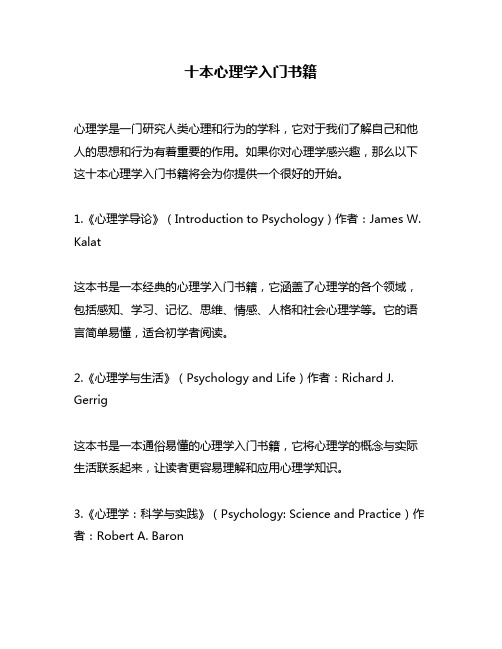
十本心理学入门书籍心理学是一门研究人类心理和行为的学科,它对于我们了解自己和他人的思想和行为有着重要的作用。
如果你对心理学感兴趣,那么以下这十本心理学入门书籍将会为你提供一个很好的开始。
1.《心理学导论》(Introduction to Psychology)作者:James W. Kalat这本书是一本经典的心理学入门书籍,它涵盖了心理学的各个领域,包括感知、学习、记忆、思维、情感、人格和社会心理学等。
它的语言简单易懂,适合初学者阅读。
2.《心理学与生活》(Psychology and Life)作者:Richard J. Gerrig这本书是一本通俗易懂的心理学入门书籍,它将心理学的概念与实际生活联系起来,让读者更容易理解和应用心理学知识。
3.《心理学:科学与实践》(Psychology: Science and Practice)作者:Robert A. Baron这本书是一本介绍心理学科学方法和应用的入门书籍,它涵盖了心理学的各个领域,包括感知、学习、记忆、思维、情感、人格和社会心理学等。
它还介绍了心理学的应用,如临床心理学、工业心理学和教育心理学等。
4.《心理学:一种探究人类行为的科学》(Psychology: An Exploration)作者:Saundra K. Ciccarelli和J. Noland White这本书是一本全面介绍心理学的入门书籍,它涵盖了心理学的各个领域,包括感知、学习、记忆、思维、情感、人格和社会心理学等。
它还介绍了心理学的历史和方法。
5.《心理学:科学与行为》(Psychology: Science and Behavior)作者:Neil R. Carlson这本书是一本介绍心理学科学方法和应用的入门书籍,它涵盖了心理学的各个领域,包括感知、学习、记忆、思维、情感、人格和社会心理学等。
它还介绍了心理学的应用,如临床心理学、工业心理学和教育心理学等。
6.《心理学:探索人类思维与行为》(Psychology: Exploring Human Mind and Behavior)作者:David G. Myers这本书是一本通俗易懂的心理学入门书籍,它将心理学的概念与实际生活联系起来,让读者更容易理解和应用心理学知识。
介绍一门学科的英语作文

介绍一门学科的英语作文Introduction to Psychology。
Psychology is the scientific study of human behavior and mental processes. It is a discipline that seeks to understand how and why people think, feel, and behave the way they do. Psychology is a broad field that encompasses many different areas of study, including social psychology, developmental psychology, cognitive psychology, andclinical psychology.One of the primary goals of psychology is to develop a better understanding of human behavior. This includes understanding the factors that influence behavior, such as genetics, environment, and social factors. Psychologists also seek to understand the cognitive processes that underlie behavior, such as perception, memory, and attention.Another important area of psychology is the study ofmental health. Clinical psychologists work with individuals who are experiencing mental health problems, such as depression, anxiety, and schizophrenia. They use a variety of techniques, such as psychotherapy and medication, to help individuals manage their symptoms and improve their overall quality of life.Psychology is also concerned with the development of individuals over the course of their lives. Developmental psychologists study how people change and grow over time, from infancy to old age. They examine the biological, social, and environmental factors that influence development, and they use this knowledge to develop interventions that can help individuals reach their full potential.In addition to these areas of study, psychology also has applications in many other fields. For example, industrial-organizational psychologists use their knowledge of human behavior to help organizations improve their productivity and efficiency. Sports psychologists work with athletes to help them develop the mental skills necessaryfor success.Overall, psychology is a fascinating and diverse field that offers many opportunities for study and research. Whether you are interested in understanding human behavior, improving mental health, or developing interventions to help individuals reach their full potential, psychology has something to offer.。
智慧树知到《Introduction to Psychology》章节测试【完整答案】

智慧树知到《Introduction to Psychology》章节测试【完整答案】智慧树知到《Introduction to Psychology》章节测试答案第1章单元测试1、According to Freud, psychological problems arise from conflict between the __ and the __.答案:Super-ego; Id2、According to Freud, what is the part of our psyche that is instinctually driven by our basic needs, wants and desires?答案:Id3、According to Freud, what is the part of the psyche that attempts to balance immediate gratification and societal norms?答案:Ego4、What is the best way to describe Freuds approach to psychology?答案:Medical5、According to Freud, what is the part of our psyche that is most interested in maintaining societal norms and decency?答案:Super-ego6、The idea that human behavior is governed by a physical component and a non physical (i.e., spiritual) component is referred to as __.答案:dualism7、What does Luigi Galvani”s research with applied electrical currents suggest?答案:For completeness, wholeness, and roundness.8、Who is credited with the development of Cartesian Dualism?答案:Rene Descartes9、What philosophical view of human behavior is best supported by the work of Paul Broca?答案:Materialism10、According to materialism, what is the cause of human behaviour?答案:Physical mechanisms11、Determining whether something is true or false by observing it through experimentation is called .答案:empiricism12、What was William James main contribution to the field of Psychology?答案:Generating and publishing ideas about psychologicaltopics13、Who is recognized as being the first psychologist?答案:Wilhelm Wundt14、Introspection is a technique wherein a person reflects upon and reports their personal experience. Early scientists criticized this technique because it was ___.答案:Indirect and subjective第2章单元测试1、What is the branch of psychology called where researchers study how groups work together and people interact with each other?答案:Social Psychology2、Which part of the scientific process is observational research best suited for?答案:Generating questions3、If the amount of time a student spent studying was positively correlated with grades achieved, what would we expect to see if someone had low grades?答案:The student did not spend a lot of time studying.4、A positive correlation between two variables means that as ___.答案:one variable increases, the other variable increases5、A scatter plot that shows a trend line that travels down to the right would demonstrate what type of correlation?答案:negative correlation6、What does SR stand for in behavioral psychology?答案:Stimulus Response7、What did the Little Albert Experiment tell us about the relation between stimuli and responses?答案:Responses to stimuli can be conditioned8、Why does cognitive psychology consider the computer to be good analogy of the human brain?答案:It processes input and generates output.9、What practice makes psychology a science rather than justa collection of ideas and arguments?答案:Experimentation第3章单元测试1、A t-test is a ratio of _ to _. 答案:错2、A t-test is an example of __ statistics.答案:between-group differences; within-group differences 3、The upper curves of the brain are called , while the deep grooves are called __.答案:gyri, fissures4、What is the order of neuron structures from receiving information, processing information and sending information?答案:synaptic cleft, cell body, dendrites5、Why does the surface of the brain contain folds?答案:They allow for more brain tissue to fit in the skull 6、Constricting pupils, stimulated digestive and salivation activity and constricting lungs are due to the activation of the _ system.答案:parasympathetic7、The peripheral nervous system links the brain to the _.答案:body8、Why is the brainstem considered to be a reptilian system?答案:It is a primitive brain structure9、Damage to which structure of the brain would result in deficits in motor learning and the production of uncoordinated movements?答案:Cerebellum第4章单元测试1、What impairment would you expect to see in an individual with damage to their primary visual cortex?答案:Black spots in their field of vision2、What is the process called in which the brain organizesand interprets visual information?答案:Perception3、Seeing a small, red, shiny object is known as __, whereas knowing this object is an apple is known as _.答案:sensation; perception4、An individual who is unable to understand speech would most likely have damage to which area in the temporal lobe?答案:Wernickes5、What is the primary role of the temporal lobe?答案:Auditory processing6、What is the term that refers to knowledge of where a persons body parts are located in space?答案:Proprioception7、Why is more cortical tissue in the somatosensory cortex devoted to the lips than to the elbows?答案:Lips require more sensory input8、What is the term used to describe the inability to switch strategies following damage to the frontal lobes?答案:Perseveration errors9、What is the primary role of the frontal lobes?答案:Complex cognitive functions第5章单元测试1、Severing what brain structure results in split brain syndrome?答案:Corpus callosum2、Cones are more common at the __ of the eye whereas rods are more common in the __.答案:C3、Understanding how visual elements group together was a major focus of those studying __ psychology.答案:gestalt4、When we look at some visual scene, what we tend to consciously see _. 答案:6A5、What is the raw input of information or signals from the environment called?答案:Sensation6、What cells in the eye are responsible for edge detection?答案:Bipolar7、What photoreceptors of the eyes react to lots of light or color?答案:Cones8、We are able to sense ____.答案:all of the energy coming at us from the world。
introduction to psychology书
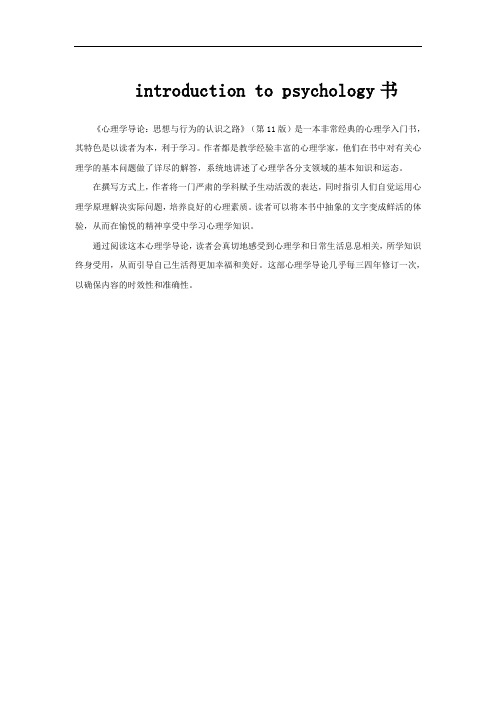
introduction to psychology书
《心理学导论:思想与行为的认识之路》(第11版)是一本非常经典的心理学入门书,其特色是以读者为本,利于学习。
作者都是教学经验丰富的心理学家,他们在书中对有关心理学的基本问题做了详尽的解答,系统地讲述了心理学各分支领域的基本知识和运态。
在撰写方式上,作者将一门严肃的学科赋予生动活泼的表达,同时指引人们自觉运用心理学原理解决实际问题,培养良好的心理素质。
读者可以将本书中抽象的文字变成鲜活的体验,从而在愉悦的精神享受中学习心理学知识。
通过阅读这本心理学导论,读者会真切地感受到心理学和日常生活息息相关,所学知识终身受用,从而引导自己生活得更加幸福和美好。
这部心理学导论几乎每三四年修订一次,以确保内容的时效性和准确性。
Introduction to Psychology心理学讲稿
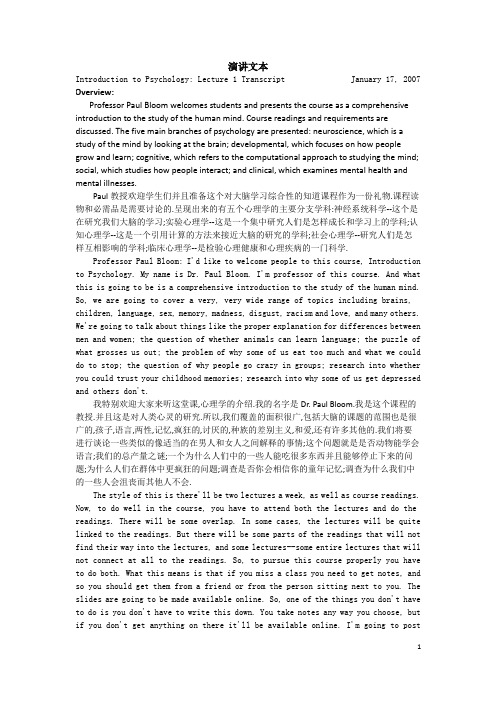
演讲文本Introduction to Psychology: Lecture 1 Transcript January 17, 2007 Overview:Professor Paul Bloom welcomes students and presents the course as a comprehensive introduction to the study of the human mind. Course readings and requirements are discussed. The five main branches of psychology are presented: neuroscience, which is a study of the mind by looking at the brain; developmental, which focuses on how people grow and learn; cognitive, which refers to the computational approach to studying the mind; social, which studies how people interact; and clinical, which examines mental health and mental illnesses.Paul教授欢迎学生们并且准备这个对大脑学习综合性的知道课程作为一份礼物.课程读物和必需品是需要讨论的.呈现出来的有五个心理学的主要分支学科:神经系统科学--这个是在研究我们大脑的学习;实验心理学--这是一个集中研究人们是怎样成长和学习上的学科;认知心理学--这是一个引用计算的方法来接近大脑的研究的学科;社会心理学--研究人们是怎样互相影响的学科;临床心理学--是检验心理健康和心理疾病的一门科学.Professor Paul Bloom: I'd like to welcome people to this course, Introduction to Psychology. My name is Dr. Paul Bloom. I'm professor of this course. And what this is going to be is a comprehensive introduction to the study of the human mind. So, we are going to cover a very, very wide range of topics including brains, children, language, sex, memory, madness, disgust, racism and love, and many others. We're going to talk about things like the proper explanation for differences between men and women; the question of whether animals can learn language; the puzzle of what grosses us out; the problem of why some of us eat too much and what we could do to stop; the question of why people go crazy in groups; research into whether you could trust your childhood memories; research into why some of us get depressed and others don't.我特别欢迎大家来听这堂课,心理学的介绍.我的名字是Dr. Paul Bloom.我是这个课程的教授.并且这是对人类心灵的研究.所以,我们覆盖的面积很广,包括大脑的课题的范围也是很广的,孩子,语言,两性,记忆,疯狂的,讨厌的,种族的差别主义,和爱,还有许多其他的.我们将要进行谈论一些类似的像适当的在男人和女人之间解释的事情;这个问题就是是否动物能学会语言;我们的总产量之谜;一个为什么人们中的一些人能吃很多东西并且能够停止下来的问题;为什么人们在群体中更疯狂的问题;调查是否你会相信你的童年记忆;调查为什么我们中的一些人会沮丧而其他人不会.The style of this is there'll be two lectures a week, as well as course readings. Now, to do well in the course, you have to attend both the lectures and do the readings. There will be some overlap. In some cases, the lectures will be quite linked to the readings. But there will be some parts of the readings that will not find their way into the lectures, and some lectures--some entire lectures that will not connect at all to the readings. So, to pursue this course properly you have to do both. What this means is that if you miss a class you need to get notes, and so you should get them from a friend or from the person sitting next to you. The slides are going to be made available online. So, one of the things you don't have to do is you don't have to write this down. You take notes any way you choose, but if you don't get anything on there it'll be available online. I'm going to postit in a format which will be black and white and easy to print out so you don't have to worry about this. But again, attending to the slides is not a substitute for attending class.心理学的风格是每个礼拜将会有两个讲座,和课程的读物是一样的。
01 Introduction to Psychology

Copyright © The McGraw-Hill Companies, Inc. Permission required for reproduction or display.
Chapter 1: Introduction to Psychology
The Subfields of Psychology
Understanding change and individual differences
– Developmental psychology
• Changes in behavior over the life span (womb to tomb)
The Subfields of Psychology
Physical and mental health
– Health psychology
• Explores relationship between psychological factors and physical ailments or disease
Copyright © The McGraw-Hill Companies, Inc. Permission required for reproduction or display.
Chapter 1: Introduction to Psychology
Module 1: Psychologist at Work
外显行为反应的一门学科
心理学是系统地研究心理过程和行为的科学
Copyright © The McGraw-Hill Companies, Inc. Permission required for reproduction or display.
大学心理学英语教材
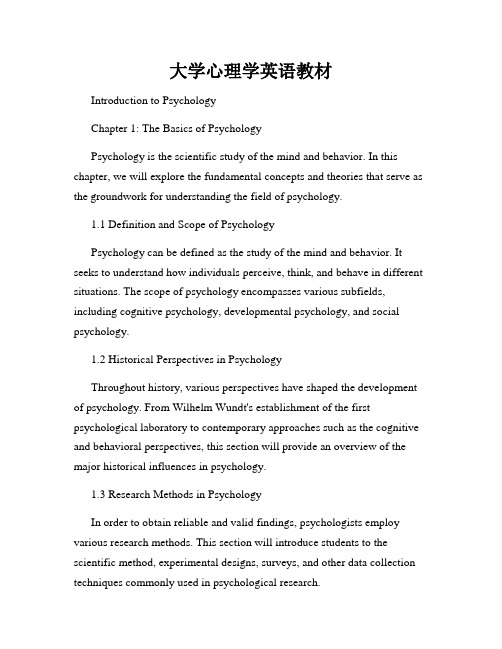
大学心理学英语教材Introduction to PsychologyChapter 1: The Basics of PsychologyPsychology is the scientific study of the mind and behavior. In this chapter, we will explore the fundamental concepts and theories that serve as the groundwork for understanding the field of psychology.1.1 Definition and Scope of PsychologyPsychology can be defined as the study of the mind and behavior. It seeks to understand how individuals perceive, think, and behave in different situations. The scope of psychology encompasses various subfields, including cognitive psychology, developmental psychology, and social psychology.1.2 Historical Perspectives in PsychologyThroughout history, various perspectives have shaped the development of psychology. From Wilhelm Wundt's establishment of the first psychological laboratory to contemporary approaches such as the cognitive and behavioral perspectives, this section will provide an overview of the major historical influences in psychology.1.3 Research Methods in PsychologyIn order to obtain reliable and valid findings, psychologists employ various research methods. This section will introduce students to the scientific method, experimental designs, surveys, and other data collection techniques commonly used in psychological research.Chapter 2: Biological FoundationsUnderstanding the biological foundations of psychology is crucial in comprehending the relationship between the brain, behavior, and mental processes. This chapter will delve into the physiological and genetic factors that influence human psychology.2.1 The Nervous SystemThe nervous system is responsible for controlling our thoughts, emotions, and actions. This section will discuss the structure and functions of the central nervous system, including the brain and spinal cord, as well as the peripheral nervous system and its subdivisions.2.2 Neurons and Neural CommunicationNeurons are the building blocks of the nervous system and play a vital role in transmitting information. Here, students will learn about the structure and function of neurons, as well as the process of neural communication through action potentials and synaptic transmission.2.3 Genetics and BehaviorHuman behavior is influenced by both genes and the environment. This section will explore the field of behavioral genetics, which examines how genetic factors contribute to individual differences in behavior and psychological traits.Chapter 3: Sensation and PerceptionSensation and perception are essential processes that allow us to interpret and make sense of the world around us. This chapter focuses on the sensory systems and the perceptual processes involved in our everyday experiences.3.1 The Five SensesThe human body possesses five main senses: vision, hearing, taste, smell, and touch. In this section, students will gain an understanding of how these senses function and interact, as well as the neural mechanisms underlying sensory perception.3.2 Perceptual OrganizationPerception involves interpreting sensory information to create meaningful experiences. This section will cover topics such as perceptual constancy, depth perception, and the Gestalt principles of organization that help us make sense of the sensory input we receive.3.3 Attention and ConsciousnessAttention and consciousness are crucial aspects of perception and cognition. Here, students will explore theories of attention, divided attention, selective attention, and the relationship between consciousness and the brain.ConclusionThis brief overview of the contents of a university-level psychology textbook provides a glimpse into the extensive field of psychology. From the basics of psychology and its historical perspectives to the biological foundations and the processes of sensation and perception, a comprehensive understanding of these concepts is essential for any student of psychology.Whether applied to personal growth, therapeutic practice, or research endeavors, the knowledge acquired from studying psychology will undoubtedly contribute to one's understanding of human behavior and mental processes.。
耶鲁大学公开课:心理学导论 Introduction of Psychology 1
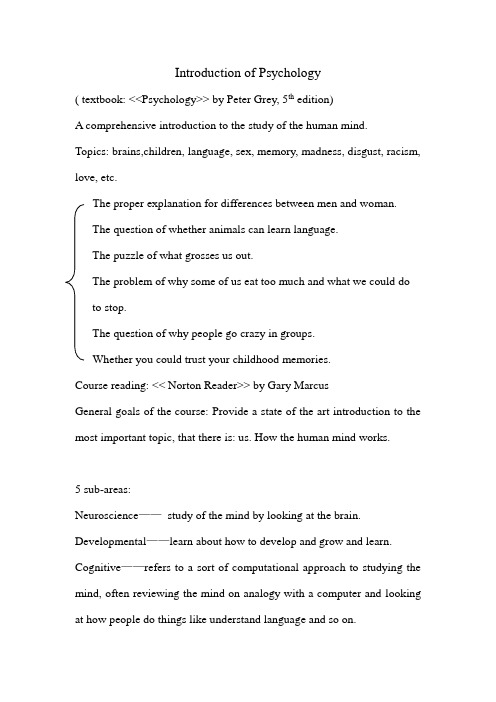
Introduction of Psychology( textbook: <<Psychology>> by Peter Grey, 5th edition)A comprehensive introduction to the study of the human mind. Topics: brains,children, language, sex, memory, madness, disgust, racism, love, etc.The proper explanation for differences between men and woman.The question of whether animals can learn language.The puzzle of what grosses us out.The problem of why some of us eat too much and what we could do to stop.The question of why people go crazy in groups.Whether you could trust your childhood memories.Course reading: << Norton Reader>> by Gary MarcusGeneral goals of the course: Provide a state of the art introduction to the most important topic, that there is: us. How the human mind works.5 sub-areas:Neuroscience——study of the mind by looking at the brain. Developmental——learn about how to develop and grow and learn. Cognitive——refers to a sort of computational approach to studying the mind, often reviewing the mind on analogy with a computer and looking at how people do things like understand language and so on.Social——how people act in groups with othersClinical——mental health and mental illnessInvolving: economics, Game Theory, philosophy,computer science, anthropology, literature, theology, other domains.How a physical thing can give rise to mental life?Question about development:1.How do we come to have knowledge? In particular, how much of it is hard-wired, built-in, innate and how much of it is the product of culture, of language, of schooling?2.To what extent is Zachary(professor's youngest son) at that age going to be that way forever? To what extent is your fate sealed?William Wordsworth:" The child is father to the man."3.What makes us the way we are?One common theory is we are shaped by our parents.Phillip Larkin:" They mess you up, your mom and dad. They may not mean to but they do, they fill you with the faults they had and add some extra just for you."4.What makes somebody attractive?Evil& GoodEvil: somebody behaving cruelly towards somebody else, perhaps not dueto malice but because of the institution that she's in.e.g. Asama Ben Laden, Ted BundyGood:e.g. Oscar Schindler, Paul RusesabaginaMajor disorders: depression& anxietye.g. Phineas Gage, 100 years ago,disorders in memoryCapgras syndrome: typically the result of some sort of stroke, create a delusion is that the person you love the most have been replaced.Cotard's syndrome: believe oneself is dead.Words:Syllabus, teaching, fellow, orient, shopping period, centrally, profanity, fugitive, overlap, floating around, multiple choice, short answer, prior, domain, stark, preoccupy, hard-wired, built-in, innate, ingenious, pinpoint, gruesome。
chapter01-Introduction to psychology(2)
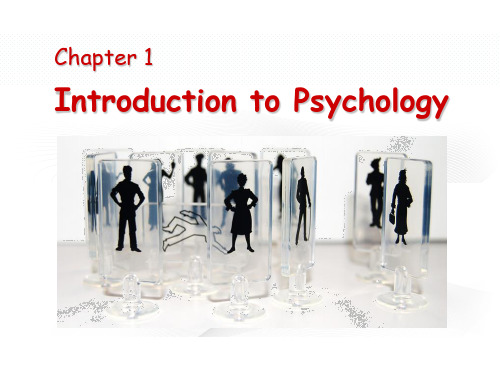
威廉·冯特(1832-1920)
20 / 88
心理学的昨天
成长
西欧:德国、英国 北美:美国 东欧:前苏联 东亚:日本、中国 其他地区
2020/9/1
Tang Hanying, CCNU
21 / 88
现代心理学在中国的发展
蔡元培
曾在莱比锡大学留学,系统地修过冯特主讲的 心理学课程,并特别重视实验心理学,回国后 任北京大学校长期间于一九一七年支持陈大齐 在哲学系内创建我国第一个心理学实验室,并 在担任中央研究院院长期间于一九二九年倡导 创建我国第一个心理学研究所。
古印度的瑜伽和佛教(冥想) 引入生理学、物理学中的实验技术
初创 成长
2020/9/1
Tang Hanying, CCNU
13 / 88
心理学的昨天
心理学诞生的基础
理论基础
理性主义、经验主义
方法论基础
生理学和物理学等学科所用到的实验方法
2020/9/1
Tang Hanying, CCNU
2020/9/1
Tang Hanying, CCNU
22 / 88
现代心理学的主要流派
结构主义(Structuralism) 代表人物:冯特、铁钦纳 主要观点: 反对哲学思辩方式,主张用自然科学的方
法研究人的意识;所有的心理现象都是由 元素构成,强调意识的结构。
2020/9/1
Tang Hanying, CCNU
10 / 49
2020/9/1
Tang Hanying, CCNU
11 / 88
艾宾浩斯(德)
心理学虽有一个漫长 的过去,但却只有一 个短暂的历史。
2020/9/1
赫尔曼·艾宾浩斯(1850-1909)
心理学英语介绍
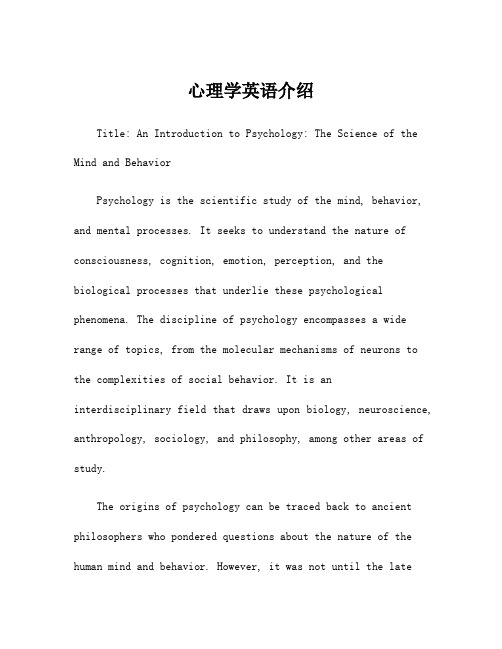
心理学英语介绍Title: An Introduction to Psychology: The Science of the Mind and BehaviorPsychology is the scientific study of the mind, behavior, and mental processes. It seeks to understand the nature of consciousness, cognition, emotion, perception, and the biological processes that underlie these psychological phenomena. The discipline of psychology encompasses a wide range of topics, from the molecular mechanisms of neurons to the complexities of social behavior. It is aninterdisciplinary field that draws upon biology, neuroscience, anthropology, sociology, and philosophy, among other areas of study.The origins of psychology can be traced back to ancient philosophers who pondered questions about the nature of the human mind and behavior. However, it was not until the late19th century that psychology began to emerge as a distinct scientific discipline. Wilhelm Wundt, considered the fatherof modern psychology, established the first psychological laboratory in Leipzig, Germany in 1879. Since then,psychology has evolved into a diverse field with various branches, including cognitive psychology, clinical psychology, social psychology, developmental psychology, and many others.Cognitive psychology focuses on the study of mental processes, such as perception, memory, language, thought, and problem-solving. Researchers in this area aim to understand how people acquire, process, store, and retrieve information from their environment. One of the key findings in cognitive psychology is the concept of working memory, which refers to the limited capacity system responsible for temporary storage and manipulation of information necessary for comprehension, learning, and reasoning.Clinical psychology, on the other hand, is concerned with the diagnosis, treatment, and prevention of mental disorders and emotional problems. Clinicians work with individuals, families, and groups to help them cope with and overcome psychological difficulties. They use various therapeutic approaches, such as psychoanalysis, behavioral therapy, cognitive-behavioral therapy, and humanistic therapy, depending on the needs of their clients.Social psychology explores the ways in which people's thoughts, feelings, and behaviors are influenced by the presence and actions of others. This branch of psychology investigates topics such as attitudes, beliefs, group dynamics, conformity, prejudice, and interpersonal attraction. Social psychologists also study the factors that contributeto prosocial behavior, such as altruism, cooperation, and helping.Developmental psychology examines changes in behavior and psychological processes over the lifespan. Researchers inthis field investigate how genetic and environmental factors interact to shape the course of human development. They study the physical, cognitive, social, and emotional growth of individuals from infancy through old age. One of the key concepts in developmental psychology is the idea of critical periods, which refers to specific times during development when certain skills or abilities are most easily acquired.Neuropsychology is another important branch of psychology that focuses on the relationship between brain function and behavior. Neuropsychologists study the effects of brain damage or disease on cognitive and emotional processes. They use techniques such as brain imaging, electrophysiological recording, and behavioral testing to assess the neural correlates of various psychological functions.In recent years, the field of psychology has been transformed by advances in technology and research methods. For example, functional magnetic resonance imaging (fMRI) has allowed researchers to observe brain activity in real-time, providing insights into the neural mechanisms underlying complex behaviors and emotions. Similarly, the availability of large datasets and sophisticated statistical tools has enabled psychologists to conduct more rigorous and precise studies than ever before.Despite its many achievements, psychology still faces numerous challenges and controversies. One major issue is the tension between the desire for scientific rigor and the need to address complex, real-world problems. Some critics argue that psychology has become too focused on laboratory experiments and statistical analyses at the expense of understanding human experience in its full richness and complexity. Others contend that psychology has been too quick to embrace reductionist explanations that emphasizebiological or genetic factors while neglecting the role of culture, history, and individual agency.Another challenge facing psychology is the issue of replicability and validity in research. In recent years, several high-profile studies have failed to replicate previous findings, casting doubt on the reliability of some psychological research. This has led to increased scrutiny of research methods and a call for greater transparency and openness in data sharing and analysis.Furthermore, psychology faces ethical challenges related to the protection of research participants, the use of deception in experiments, and the potential misuse of psychological knowledge for harmful purposes. As psychologists gain access to increasingly sensitive personal information through technologies such as online surveys and social media, they must grapple with issues of privacy, confidentiality, and informed consent.Despite these challenges, psychology remains a dynamic and exciting field that offers numerous opportunities for research and innovation. From understanding the neural basis of addiction to developing effective interventions for mental health disorders, psychologists continue to make significant contributions to our understanding of human behavior andwell-being.In conclusion, psychology is a vast and complex fieldthat encompasses a wide range of subdisciplines and specialties. From cognitive processes to social interactions, from developmental milestones to neurological disorders, psychology seeks to unravel the mysteries of the human mind and behavior. While it faces numerous challenges and controversies, psychology remains a vital and vibrant science that promises to shed light on some of the most fundamental aspects of what it means to be human.。
心理学概论(英文)

RenéDescartes (1596-1650)
Problem - No “scientific” way of studying problems
Physiology asks similar questions about the mind
SCIENTIFIC METHOD
Predict what will happen Systematically observe events Do events support predictions
Ph.D. in Psychology. Wrote The Animal Mind, which helped begin the Behaviorist movement.
Leta Hollingworth - Debunked popular theories
that suggested women were inferior to men. Did pioneering work on adolescent development,
Phi Phenomenon
Illusion of movement created by presenting visual stimuli in rapid
The RAT & S-R Psychology
B. F. Skinner (1904-1990) Behaviorism with a Twist The PIDGEON & The Skinner Box
Structuralism vs Functionalism
Structuralism
Analyze consciousness into basic elements and study how they are related
描述最喜欢的一门课程英语作文

描述最喜欢的一门课程英语作文My Favorite Course: Introduction to PsychologyOne of my favorite courses in college was "Introduction to Psychology." This course was an eye-opener for me as it delved into the intricacies of the human mind and behavior. It was a subject that not only fascinated me but also provided a deeper understanding of why people think and act the way they do.The course was taught by a dynamic and engaging professor who had a passion for psychology. Her lectures were always interactive, encouraging us to think critically about the theories and concepts discussed. We explored topics such as personality development, cognitive processes, social psychology, abnormal psychology, and the history of psychological thought. Each lecture was like unraveling a new layer of the human psyche, making the course both challenging and engaging.What I particularly enjoyed about this course was thevariety of ways we were assessed. The coursework included traditional exams, but we also had to complete weekly quizzes, participate in class discussions, and write essays applying psychological theories toreal-life situations. These assignments not only tested our knowledge of the material but also our ability to apply psychological concepts in a practical context.One of the most memorable aspects of this course was the field trips we took to visit a local mental health facility and a psychology research laboratory. These experiences provided a practical insight into the theories we learned in the classroom. Seeing firsthand how mental health professionals and researchers conduct their work was incredibly enlightening and reinforced my interest in the field.Moreover, the course materials were thoughtfully selected, including several textbooks, psychological articles, and videos to provide a comprehensive understanding of the subject. The readingscomplemented the lectures and allowed us to explore specific topics in greater depth.In conclusion, "Introduction to Psychology" was my favorite course because it offered a lively exploration of the human mind and behavior. The course waswell-organized, taught by an enthusiastic professor, and provided a hands-on learning experience. The insights gained from this course not only expanded my understanding of psychology but also contributed to my personal growth and worldview. It was an enriching journey that ignited a lifelong passion for the study of human behavior.。
在大学开设心理学课程英语作文
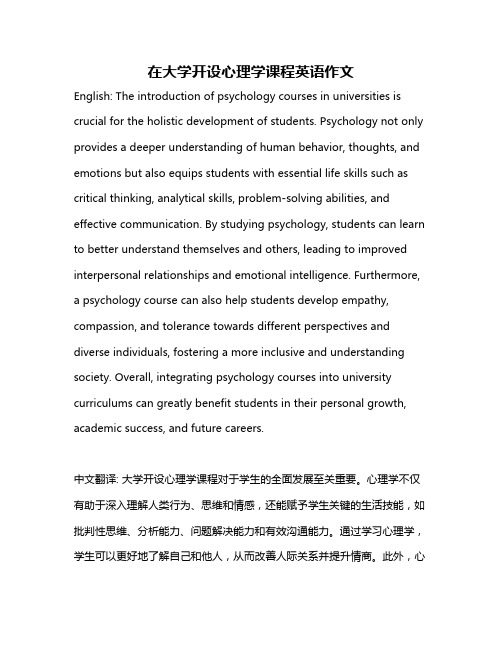
在大学开设心理学课程英语作文English: The introduction of psychology courses in universities is crucial for the holistic development of students. Psychology not only provides a deeper understanding of human behavior, thoughts, and emotions but also equips students with essential life skills such as critical thinking, analytical skills, problem-solving abilities, and effective communication. By studying psychology, students can learn to better understand themselves and others, leading to improved interpersonal relationships and emotional intelligence. Furthermore, a psychology course can also help students develop empathy, compassion, and tolerance towards different perspectives and diverse individuals, fostering a more inclusive and understanding society. Overall, integrating psychology courses into university curriculums can greatly benefit students in their personal growth, academic success, and future careers.中文翻译: 大学开设心理学课程对于学生的全面发展至关重要。
- 1、下载文档前请自行甄别文档内容的完整性,平台不提供额外的编辑、内容补充、找答案等附加服务。
- 2、"仅部分预览"的文档,不可在线预览部分如存在完整性等问题,可反馈申请退款(可完整预览的文档不适用该条件!)。
- 3、如文档侵犯您的权益,请联系客服反馈,我们会尽快为您处理(人工客服工作时间:9:00-18:30)。
In my experience as a teacher, one of the most reliable aspects of teaching introductory psychology is that students offer questions that are urgent for them:
My mother is taking Prozac: Will we learn what it does?
Are you going to teach us how to study better?
What should I do if I have a friend talking about suicide?
the scientific aspect of psychology requires that psychological conclusions be based on evidence collected according to the principles of the scientific method. The scientific method
consists of a set of orderly steps used to analyze and solve problems. This method uses objectively collected information as the factual basis for drawing conclusions.
Behavior is the means by which organisms adjust to their environment. Behavior is action. The subject matter of psychology largely consists of the observable behavior of humans and other species of animals. Smiling, crying, running, hitting, talking, and touching are some obvious examples of behavior you can observe. Psychologists examine what the individual does and how the individual goes about doing it within a given behavioral setting and in the broader social or cultural context.
The subject of psychological analysis is most often an individual—a newborn infant, a college student adjusting to life in a dormitory, or a woman coping with the stress of her husband's deterioration from Alzheimer‘s disease. However, the subject might also be a chimpanzee learning to use symbols to communicate, a white rat navigating a maze, or a sea slug responding to a danger signal. An individual might be studied in its natural habitat or in the controlled conditions of a research laboratory.
Many researchers in psychology also recognize that they cannot understand human actions without also understanding mental processes, the workings of the human mind. Much human activity takes place as private, internal events—thinking, planning, reasoning, creating, and dreaming. Many psychologists believe that mental processes represent the most important aspect of psychological inquiry. As you shall soon see, psychological investigators have devised ingenious techniques to study mental events and processes—to make these private experiences public.
The combination of these concerns defines psychology as a unique field. Within the social sciences, psychologists focus largely on the behavior of individuals in various settings, whereas sociologists study social behavior of groups or institutions, and anthropologists focus on the broader context of behavior in different cultures. Even so, psychologists draw broadly from the insights of other scholars. Psychologists share many interests with researchers in biological sciences, especially with those who study brain processes and the biochemical bases of behavior. As part of cognitive science,psychologists’questions about how the human mind works are related to research and theory in computer science, philosophy, linguistics, and neuroscience. As a health science—with linksto medicine, education, law, and environmental studies—psychology seeks to improve the quality of each individual’s and the collective’s well-being.。
